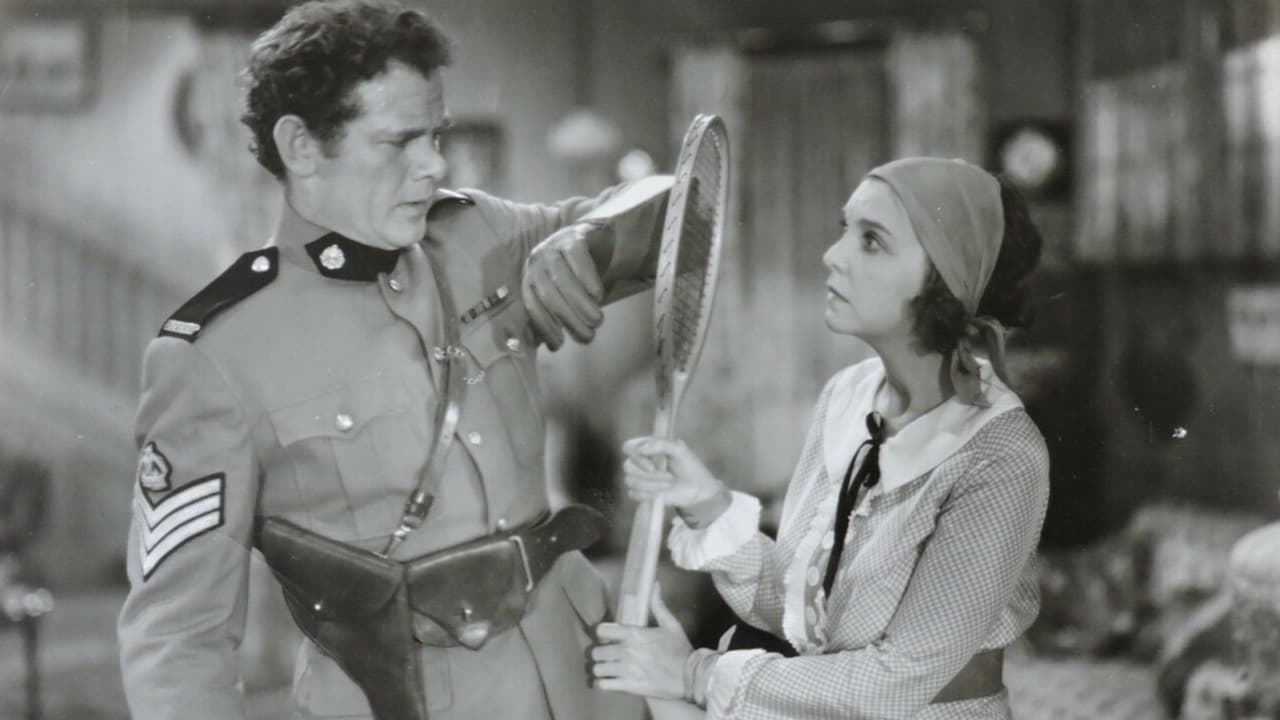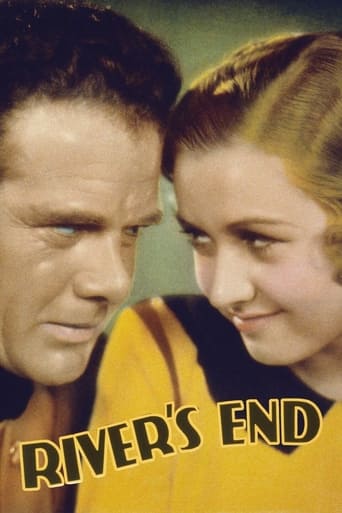



How wonderful it is to see this fine actress carry a film and carry it so beautifully.
View MoreA movie that not only functions as a solid scarefest but a razor-sharp satire.
View MoreActress is magnificent and exudes a hypnotic screen presence in this affecting drama.
View MoreThrough painfully honest and emotional moments, the movie becomes irresistibly relatable
View MoreWhen Lewis Stone shakes hands with himself in 1922's Prisoner of Zenda I thought I'd never see a better bit of trick photography. But River's End goes two or three better with its effects. Charles Bickford plays cards with himself. He crosses behind a chair and when he reaches the other side picks up his other self's wrist to take his pulse. Finally, he checks his other self's breathing by placing his head on his chest while laying his hand over his other self's hand. There are lots of standard split screen effects in the film, too. You'll want to watch these tricks multiple times to try to guess how they were done.As for the film itself, it's early enough not to use the standard plot devices. The hero's untenable position seem genuine. There really is no easy way out. However, after the action of the first few minutes the film drags into a talk fest. I wished it were about 15 minutes shorter.
View MoreCharles Bickford was a larger than life character whose outspokenness eventually ended in a showdown with Louis B. Mayer (Bickford called him a "posturing little ignoramus"). The fight was over a film called "The Sea Bat" - Bickford thought it was garbage. Mayer saw to it that he never worked on any of the A movies he was promised (how great he would have been in "Cimarron", also "The Big House" and "The Maltese Falcon"). "River's End" came directly after, an intriguing Canadian Mountie adventure directed by that "man's" director Michael Curtiz. To have Bickford play both the murderer Keith and the Mountie Conniston who brings him in, was a terrific idea and gave this early talkie real novelty. No, they were not long lost twins with one brother gone to the bad or that the Mountie was leading a secret life. Conniston was determined to get his man and the unfortunate thing was that they were both mirror images of each other. Keith is arrested from his hideout (a ship that had become lodged in the ice) within 5 minutes of the movie's start but while bringing him in circumstances are reversed. Conniston becomes sick and Keith then becomes the one they both turn to (J. Farrell MacDonald is Connie's offsider). Connie, in his delirium, mentions Mimi, the Inspector's daughter, but when he dies, O'Toole, who is impressed with the help Keith has given them turns his allegiance to the convict. By the time they get to the outpost Keith is well versed in all of Connie's mannerisms and sayings. He seems to have everyone fooled except O'Toole's kid, Mickey (Junior Coghlan in a charming performance) - you see, Connie chewed gum and Keith never touches the stuff.The twist, half way through, is that Keith has now been cleared of the murder he was originally caught for and he is more anxious than ever to escape across the border. But that is before he meets the beautiful Mimi and what an eyeful Evalyn Knapp is, she was so pretty and not any worse of an actress than many others who succeeded at that time. Should he stay and try to win her or leave her to his rival, a "dizzy dude" named Martin. From what he is learning about Connie he finds he is not the man he appeared and has a few unsavoury secrets that are soon exposed. He confesses all to Mickey and together they await the arrival of O'Toole who can verify his story but O'Toole dies on his way to the outpost ......Evalyn Knapp, who had been in a series of shorts, hoped that the dramatic "Sinner's Holiday" would give her career the boost it needed. Unfortunately the supporting cast was headed by James Cagney and Joan Blondell, so it was "Goodbye Evalyn" before she had a chance to say hello!! After that it was on to programmers like "Air Hostess" with James Murray.
View MoreYou can enjoy Charles Bickford in a rare (dual) leading role and watch Michael Curtiz learning to master talkies in this rugged melodrama, an improbability about a Mountie who gets his man and lives, though not for long, to regret it. Unusual for this period, it has refreshingly ambiguous morality -- the Mountie, outwardly such a mensch, turns out to have an interesting secret, and the bad guy turns out to be not bad at all. Add to that an appealing supporting cast, with vivacious, pretty Evalyn Knapp (she looks a little like Joan Blondell around the same time) and the excellent Junior Coughlan, a comparatively subtle kid actor who doesn't overdo cute, like Freddie Bartholomew, or grate the ears, like Jackie Cooper. Some of the art direction is forcedly unreal, almost Expressionist, and the ending's abrupt and unconvincing. But the snowy exteriors are vivid and believable, and Bickford's good enough to leave you wondering why he didn't attain leading-man status for a longer period.
View MoreMichael Curtiz directs Charles Bickford in a story of rugged adventure in the Frozen North piney woods - sounds great.Well, for the first ten minutes, with mountie Bickford getting his man, unshaven fugitive Bickford, and the dialogue in Eskimo (I kid you not) this one does intrigue, even if Ben Carré's painted on canvas cabin walls aren't going to fool anyone. The effects work with the doubled-up character is really ingenious and the confrontation has a harshness that we're not used to.Unfortunately, as with so many early sound films, all the good stuff is in the opening and then the movie gets on with what people have paid good money to watch - actors talking.The leads aren't at all bad but the dumb plot lets them down.I wonder who thought it was worth another go round in 1940?
View More